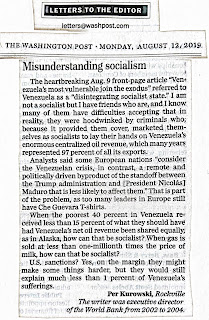Sunday, July 06, 2025
Thursday, January 11, 2024
Who will be stronger, American, Ukrainian or Venezuelan 16 years old?
Friday, August 18, 2023
We need Masters in Dialogue with Artificial Intelligence; MDAIs
We need Masters in Dialogue with Artificial Intelligence; MDAIs
Monday, November 28, 2022
Before the debt ceiling is lifted, which it must be, Congress must dare to at least pose a question.
Note 1988: "Assets for which bank capital requirements were nonexistent, were what had the most political support; sovereign credits. A ‘leverage ratio’ discouraged holdings of low-return government securities” Paul Volcker
A letter in the Washington Post
Tuesday, November 01, 2022
In USA purple and violet are expelled. It is either red or blue.
Sunday, April 24, 2022
A Bureaucracy Autocracy has been constructed with stealth
PS. I have recently enlisted #AI ChatGPT - OpenAI to help me fight the Bureaucracy Autocracy. "What would you opine of risk weighted bank capital requirements with risk weights assigned for political reasons?"
Here's a letter the Washington Post published August 2023. It refers to Paul Volcker’s valiant courageous and honorable confession on what happened 1988. Thanks @PostOpinions for not ignoring it.
Sunday, January 30, 2022
Don’t divide America’s children into those with poor or better off parents.
Saturday, June 12, 2021
No remittances without representation!
The June 8 news article "In Guatemala, Harris offers stern words on corruption" reported extensively on Vice President Harris's travel to Guatemala, where the United States, by offering financial cooperation, hopes to reduce the flow of illegal migration from Central America and stimulate better behaviors, e.g., less corruption.
Wednesday, October 21, 2020
All we are saying is give “herd immunity” a chance
Sunday, April 19, 2020
The capacity to borrow at reasonable rates is a strategic sovereign asset
PS. A reverse mortgage on our children’s and grandchildren’s future
Monday, August 12, 2019
Misunderstanding socialism
Wednesday, July 11, 2018
Trade wars will mean new tariffs
Monday, October 02, 2017
Would not those willing to cut taxes belong to the anti-Sheriff of Nottingham party?
Sunday, March 22, 2015
For each drone kill, the “home of the brave” might become more vulnerable.
A letter not published L
Sunday, December 27, 2009
Another 'worst': Faulty bank regulation
https://subprimeregulations.blogspot.com/2010/05/letter-in-washington-post.html
Friday, June 20, 2008
A letter in Washington Post: An Aspect of the Bubble
A letter in the Washington Post: "An Aspect of the Bubble"
Wednesday, March 21, 2007
Four Years and Counting in Iraq: Regarding "Lessons of War"
Friday, February 23, 2007
We must build more McPrisons
Have you heard someone say that one country is 30% fairer than another? Of course not. Justice, situated on a continuum that goes from its total absence to Divine Justice, is very difficult to measure. Injustices are easier to identify and we all know that in most of our countries, prisons represent one of the worst.
To make the best possible use of scarce resources, it is important to be able to measure results and in this sense judicial reforms in many of our countries, sometimes financed with the help of multilateral entities, could advance faster by focusing on eliminating injustices. , for example by improving prison facilities, than by seeking justice by investing in courts.
In the first weeks of 2007 we have already been shocked with news about 16 prisoners killed in a fight in Venezuela and another 20 in El Salvador. Since the judges are very aware that the conditions in prisons are so shameful that they can even resemble those of a Nazi extermination camp, we sometimes wonder if the judges themselves should not be sued before the International Court of Justice. , for his crimes against humanity.
When we then observe how so many people who come from Central America are returned by the United States to their countries of origin, due to having committed some criminal act, even knowing that those countries do not have the necessary resources to face that problem and even less achieve the social rehabilitation of the prisoner, it is clear that we find ourselves immersed in a criminally vicious circle.
To get out of this centrifuge-of-terror, the United States should then help the countries of Central America to build and operate better prisons. Such collaboration could be effected by some states keeping prisoners in a prison in Central America, rather than in California, Virginia, or Maryland.
Today, in the U.S. There are about 2.2 million prisoners, many of whom are from Central America and each of them can cost their respective state between 30,000 to 20,000 dollars annually, depending on whether the prisons are public or are being operated by private companies. The above shows the immense win-win potential that exists in a proposal that, at the same time as managing to introduce modern prisons in Central America, makes it easier for the states of this country to achieve their fiscal balances.
The aforementioned prisons, which would be operated by specialized companies on the basis of strict quality certifications, such as ISO 9000 and supervised by independent organizations, could, once the investment has been amortized with the income from providing services to the United States, be transferred to the United States. governments of Central America.
In the same way that McDonald's-type franchises managed to transfer better service standards to many developing countries, McCárceles would help improve prison systems, educating specialized personnel and establishing points of comparison that stimulate the much-needed sense of the shame.
It all originated here https://perkurowski.blogspot.com/2009/09/mcprison.html















